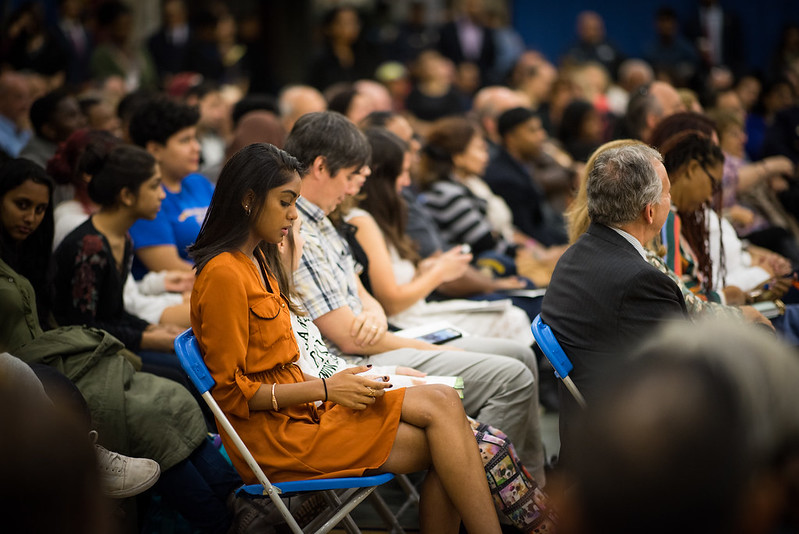
Engaged New Yorkers (photo: Edwin J. Torres/Mayoral Photography Office)
We are in a critical moment. We’ve been seeing how the national political arena has impacted everyday life at a hyper-local level. But amid an ongoing dialogue on polling, voter engagement, and how the presidential election will shape our nation we continue to miss the mark on how elections affect municipalities. The broad strokes of national politics continue to exclude the significant local impact that an election of this magnitude can have.
As we look beyond this month and this election, in the wake of a pandemic that has yet to subside, we are just less than eight months out from a wave of local elections that can flip our democracy on its head. Too few seem concerned about expanding how we engage and inform voters -- but we must.
From one presidential election to the next, and three years of local and state elections, our democracy remains largely stagnant. We continue to invent ways to bring people to the table but fail to actualize these new systems with processes. We pushed student voter registration and now automatic registration, yet the civics curriculum in schools remains nonexistent. We voted for a citywide participatory budgeting process. Yet, it -- one of the only voting processes that encourages student and undocumented civic engagement and enables voting on actual initiatives that directly impact communities -- is not being implemented. Our judges remain invisible to the electorate, while many on the bench gain access to power through backroom deals brokered to control our courts and uphold the law, often to the detriment of our children and underserved neighbors. The Board of Elections continues misfiring every single election, every single year, yet its control by political parties goes unchanged. Poll sites misinformed, ballots unclear, voter purges, and New Yorkers too often left in the dark.
These are reasons local elections are essential. They determine where our tax dollars go, the policing of Black and brown neighbors, housing our seniors, maintaining our transit system, paving our roads -- they dictate the type of struggle we live.
We need leaders who understand how to engage communities of color that have lost faith in a system that falsely alludes to inclusivity and a democratic process. Through in-depth, intentional civic engagement that represents every person's best version in our communities, we can ensure people can be seen, heard, and understood more effectively. That is how more community members will become involved on the local level -- through community board meetings, PTAs, local organizing, and the electoral process. Involvement is how we change our communities' dynamics.
Local engagement in the electoral process can change the face of politics in 2021. After the 2017 election, we found other ways to improve the connection communities have to leadership and the democratic process. We have uncovered ways to uplift the community's voice and give our neighbors a seat at the table. We began building a bench of new leaders in the Bronx, which turned out to be massively beneficial. In the shadow of Trump's presidency, we have been dealt a terrible blow through the coronavirus pandemic. The Bronx was already suffering through unemployment, homelessness, and food insecurity before COVID-19; all have become exacerbated. We already lacked federal support, and many felt as though the Bronx was fated to fall further and further behind. Through the bench of new community leaders that we fostered, we can assemble and find ways to protect Bronxites and look after those most vulnerable. Over the past six months, I and several others stepped up by building a mutual aid network serving hundreds of neighbors weekly, filling the void of social services, providing healthy fresh food and groceries, baby essentials, PPE, and more.
We saw that communities could come together, serve each other, and work towards standard solutions. This model has been replicated across the city and validates the connection that our neighbors deserve. When community members are engaged they share and develop new ideas and invest in finding solutions and discourse to address their communities' issues. This participation influences elected officials and public policy, serves as a check on our government and unites people under a shared purpose; building trust, empathy, deep connections, and a community base.
As we just saw millions vote in the presidential election, we should be reminding them that there are more ways to create an impact. The engagement we feel now, the importance of our vote and this election, needs to be a familiar feeling. We have seen an energy and passion for bringing dignity into our politics. That means we should be fostering a vocal and involved electorate that also considers the local matters that impact us day-to-day. I can only hope that we continue, and am optimistic about the type of representation that would deliver for us if we maintain this engagement locally. Our vote is not only necessary every four years. Our impact can resonate much closer to home. We have to stay engaged and help bring others with us. Our democracy relies not only on our votes but on our voice; let's use it to keep ourselves and others involved, informed, and accountable.
***
Amanda Farias is a candidate for City Council in the 18th City Council District in the Bronx. On Twitter @AmandaFariasNYC.
***
Have an op-ed idea or submission for Gotham Gazette? Email This email address is being protected from spambots. You need JavaScript enabled to view it.